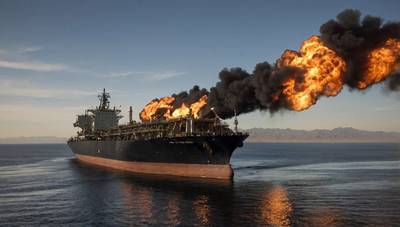What is more influential on crude oil? What is more influential: US bombs, or Iran's quiet allies?
The sharp decline in the Israel-Iran War Premium for Crude Oil shows how a few key words can move the market. However, it also hides the influence of those who remain largely silent.
Brent futures, the global benchmark, plunged after U.S. president Donald Trump announced a "complete" and "total" ceasefire will be implemented between Israel and Iran.
Brent crude oil ended Monday at $71.48 per barrel, down 7.2% compared to its previous close. It has also given up on its earlier rally which saw it reach as high as $81.40 - the highest since January 17.
Early Monday, crude prices soared amid fears that Iran could respond to U.S. involvement in Israel's attack with a bombing of three nuclear facilities.
The media was filled with reports that Iran might try to blockade the Strait of Hormuz, through which 20% of the world's crude oil and natural gas (LNG), passes every day. Or that Tehran could target U.S. bases in the area.
The Iranian response ended up being a symbolic strike against a U.S. military base in Qatar. Most of the missiles were intercepted, and there was only limited damage reported.
In early Asian trading on Tuesday, the price of crude oil continued to fall. It fell as low as $68,23 per barrel, a drop of 4.4%, and returned to its level on June 12, a day before Israel began its bombing campaign on Iran.
Trump is likely to claim credit for the ceasefire in the conflict between Israel and Iran. He will also point out that the U.S. bombed Iran's nuclear facility and Tehran's lack of response was proof he chose the right thing.
The entry of the U.S. into the conflict was certain to have changed the calculations of Iran’s rulers.
If it's true that Tehran has backed off, is it because Trump demanded Iran's surrender or because of the influence from what might be called the more discrete players?
Allies who are mute
After the U.S. airstrikes, Iran's main allies, China and Russia, perhaps even India, issued pro-forma declarations calling for a ceasefire.
China is Iran's biggest ally as it is its only major buyer of crude oil that has been sanctioned.
China's ambassador at the United Nations was the most outspoken in its condemnation of the U.S. attack. He said that the parties involved, including Israel, should "immediately cease fire" to avoid an escalation and a war-like situation.
The ambassador to the United Nations may be a high-ranking diplomat, but it is important that China did not use a higher ranking member of the government to condemn America, and its support for Iran was at best muted.
Tehran has probably learned that China's friendship depends largely on the free flow of oil through the Strait of Hormuz and a rapid de-escalation of tensions so that the risk premium can be lost.
It is likely that Indian Prime Minister Narendra Modi delivered the same message to Iranian President Masoud Pesekhkian in a telephone call on 22 June.
There's a good chance that many other countries in the Middle East also quietly sent the message that any attack on crude production, export infrastructure or shipping would not be in anyone's best interest.
What lessons can we learn from Israel's 12-day campaign against Iran?
First, crude oil prices are still affected by geopolitical risk. These movements tend to be volatile and short-lived.
Second, the self-interest shared in keeping oil flowing is always in evidence. This makes it likely that any risk premium on oil prices will be temporary.
Third, Iran is weaker than two weeks ago. However, there are still many questions about what this will mean for its future and the nuclear ambitions of its leaders.
Fourth, despite Trump’s hyperbole and bombast, there are few reasons to believe the Middle East has become more stable or safer.
You like this column? Open Interest (ROI) is your new essential source of global financial commentary. ROI provides data-driven, thought-provoking analysis on everything from soybeans to swap rates. The markets are changing faster than ever. ROI can help you keep up. Follow ROI on LinkedIn, X.
These are the views of a columnist who writes for.
(source: Reuters)







